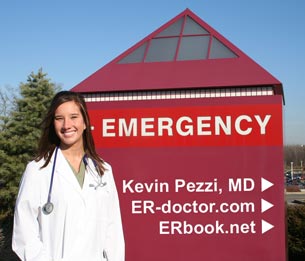How to find out if becoming an ER doctor is truly what you want to do
Q: I am a 14-year-old girl and have a goal to be an ER physician. I was wondering if you could give me information on various jobs in a hospital that I could do now or when I get a little older so I can be sure I really want to go into this field of work. Thanks, Jaclyn
 Answer by
Kevin Pezzi, MD: Call the local emergency department and ask one or more of its ER doctors if you can "shadow" him (that is, follow him around to observe what he does). I did that, and one of the students who shadowed me is now a doctor herself.
Answer by
Kevin Pezzi, MD: Call the local emergency department and ask one or more of its ER doctors if you can "shadow" him (that is, follow him around to observe what he does). I did that, and one of the students who shadowed me is now a doctor herself.
By the way, if you get a "no," don't give up. Every ER doctor is different in his willingness to help the next generation of physicians. In most ERs, only nurses or clerks answer the phone (for medicolegal reasons . . . another story), and those people often will not let you speak to the doctor on duty. So how do you get through to him (or her)? You could go to the ER and ask to speak with the ER doctor—just be prepared to wait for hours if the ER is busy! Alternatively, you could send a letter or e-mail to the Chairman of the ER (see the hospital's web site).
By the way, I congratulate you on having the wisdom and foresight to find out what an occupation entails before jumping into it. One question you should ask yourself is whether being an ER doctor is a good fit for your personality. Many doctors (myself included) made the mistake of thinking of what they can do rather than what they should do.

She's ready to shadow an ER doctor! :-)
For example, I am a perfectionist. That attribute is desirable for many specialists, but not ones who work in busy, short-staffed emergency departments (as many ER doctors do). Why? When things get very busy—one doc with several critically ill and injured people to care for in addition to the usual few dozen patients with everything from abdominal pain to ankle sprains to drug overdoses and whatnot—cutting corners often becomes mandatory. As a perfectionist, I want to give every patient perfect care. But what if taking the time to give perfect care to Patient A kills Patients B and C because you didn't have time to see them?
So what do you do? You spread yourself a bit thinner, knowingly give imperfect care, and let it gnaw at you later. It doesn't bother some doctors to give imperfect care, and some docs really don't know what perfect care is. After serving on a Quality Assurance Committee and reviewing the charts of many ER doctors, I know that most of them routinely do woefully incomplete assessments. Here are two of their many errors of omission: seeing elderly patients with abdominal pain without doing a rectal exam or checking for distal pulses.
While I was training in plastic surgery as part of my residency, I was assisting on an operation in which the surgeon excised a cancer from a man's lower lip and took well over an hour to suture the wound. He didn't like how the final result looked, so he pulled out every stitch and did it over again. Plastic surgeons often have enough time to be perfectionists. If you spend three hours working on one patient in the ER, you might give the local funeral homes a lot of business.
In one of the many question and answer pages in my www.ERbook.net site, I discuss the subject of personality characteristics or attributes best suited for emergency room doctors.
Back to the main Question & Answer page


